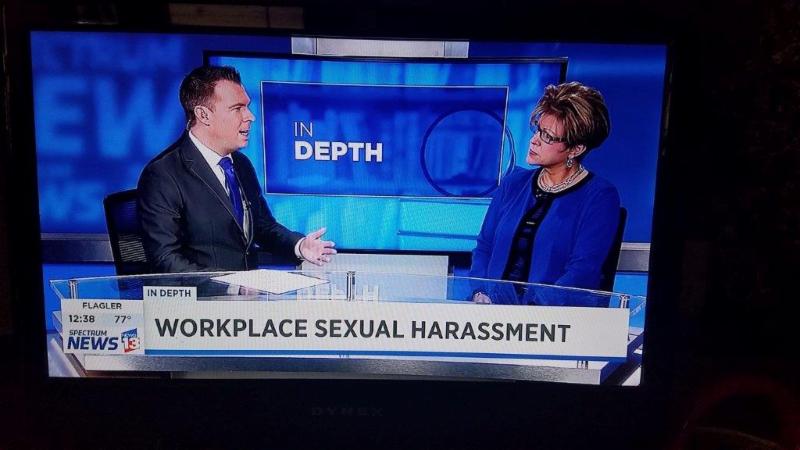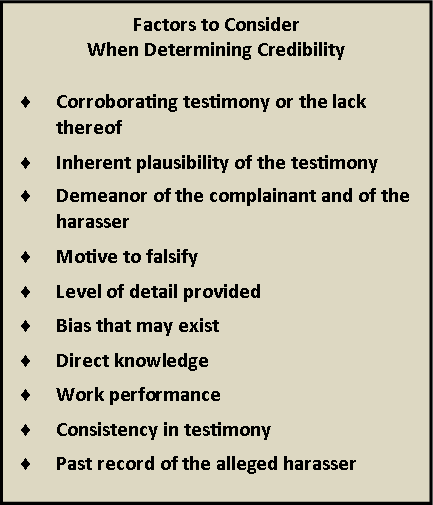Sexual Harassment
The Floodgates Are Open . . . Will Your Company Sink or Swim?
by Jean Seawright
Check any news outlet today and you're almost certain to hear about a new sexual misconduct scandal involving an executive, politician, or entertainer. The allegations are nothing short of shocking, ranging from offensive acts of sexual harassment to criminal acts of sexual assault. In response, a multitude of corporations are mandating sexual harassment training for all employees.
This surge of sexual misconduct allegations has, once again, put sexual harassment in the spotlight. Sexual harassment is a prohibited form of sex discrimination under Title VII of the Civil Rights Act of 1964. This federal law is enforced by the Equal Employment Opportunity Commission (EEOC) and covers businesses with 15 or more employees in 20 or more calendar workweeks in the current or preceding year. Even if your business is not covered by Title VII, it may be covered by a state, local, or county anti-discrimination law that prohibits workplace harassment for smaller businesses.
Sexual conduct becomes unlawful under employment regulations when it is unwelcome and severe or pervasive enough to alter the conditions of employment and create an abusive working environment. This happens when the harassment culminates in a tangible employment action (e.g., termination, demotion, etc.) or is sufficiently severe or pervasive to create a hostile work environment. Today, an employer can be held liable for sexual harassment by a supervisor even if it had no knowledge of the supervisor's misconduct. Gone are the days of "hear no evil, see no evil, know no evil" defenses. If your business receives a charge of sexual harassment discrimination from the EEOC or another fair employment practices agency and you can't prove that you attempted to prevent harassment and/or that you adequately addressed the complaint, you're guilty.
No question, the rules have changed. And let's not forget the undeniable evidence of harassment that social media, mobile recording devices, and hidden cameras provide. But, undeniable evidence of harassment is not required for a company to take employment action against an alleged harasser.
 What is required is an adequate investigation conducted by an unbiased party (usually not the alleged harasser's boss) and, oftentimes, a credibility determination after the investigation is completed. Making a credibility determination can be uncomfortable but, at times, is necessary--especially when there is no direct evidence of harassment. According to the EEOC, the fact that there are no eye witnesses, no direct evidence of harassment, and/or no admission by the accused does not necessarily defeat the complainant's credibility.
What is required is an adequate investigation conducted by an unbiased party (usually not the alleged harasser's boss) and, oftentimes, a credibility determination after the investigation is completed. Making a credibility determination can be uncomfortable but, at times, is necessary--especially when there is no direct evidence of harassment. According to the EEOC, the fact that there are no eye witnesses, no direct evidence of harassment, and/or no admission by the accused does not necessarily defeat the complainant's credibility.
Don't make the mistake of thinking that these elements are necessary before acting. The probable cause standard adopted by law enforcement does not apply to employment decisions made by employers.
And, by all means, don't adopt a "three strikes and you're out" philosophy when addressing harassment allegations. Permitting an alleged harasser to remain employed until there are three complaints against him or her is a potentially dangerous and costly approach to resolving workplace harassment complaints. This philosophy should never be adopted. In essence, this practice sends a message that it takes three incidents of harassment before one is deemed to be credible. (As if the volume of complaints makes a difference in determining if they are credible!)
When investigating allegations of harassment, keep in mind that a single incident or isolated incidents of offensive sexual conduct or remarks generally do not create an abusive/hostile environment; however, a single, unusually severe incident of harassment (e.g., unwelcome, intentional touching of a person's intimate body areas) may be sufficient to constitute a Title VII violation. The more severe the harassment, the less need to show a repetitive series of incidents, particularly when the harassment is physical.
When it comes to harassment, don't assume that an employee's initial acceptance of harassing conduct waives his or her right to complain later. Conduct that is initially welcomed may later be unwelcome. In addition, the "it was invited" defense doesn't go too far with the EEOC. Their position is that participation in sexual conduct and provocative speech or dress do not necessarily show that sexual behavior was welcomed.
To reduce exposure to sexual harassment and to create an organizational culture that prevents harassment, we recommend a three-pronged approach:
FIRST, develop, disseminate, and vigorously enforce a comprehensive policy against harassment. Ensure your policy forbids harassment; defines prohibited conduct; provides multiple channels for making complaints known to management; commits to conducting a prompt, thorough, and impartial investigation; ensures confidentiality to the extent possible; and prohibits retaliation. Sexual harassment policies must be written carefully to comply with EEOC enforcement practices. Don't rely on an unknown person from the internet to author your harassment policy.
As a Client of The Garden Center Group, you can request the Seawright & Associates Sample Policy Against Harassment by clicking HERE.
SECOND, conduct periodic sexual harassment training at all levels. Allocate the necessary resources to annual harassment training. It's a wise investment! Be sure to include owners and all managers in the training and document attendance. Seawright & Associates is available to conduct comprehensive harassment training for all employees. Our live, interactive 3-hour training program is both enlightening and educational! Click HERE to see what's included in this training.
THIRD, take every complaint seriously and investigate immediately. It doesn't matter if the complaint is lodged by a "habitual trouble-maker," if it involves an allegation against a customer (employers have the same responsibility when the claim involves a customer), if it seems trivial, or if the complainant is unwilling to submit the complaint in writing. Investigate it immediately using a well-trained and impartial investigator. When necessary, hire a third-party, qualified consultant to conduct a comprehensive investigation. Then, take appropriate action based on the results. Enforce a culture of accountability when it comes to harassment.
In light of the media attention on sexual misconduct in the workplace, now is also a good time to reiterate your company's commitment to a workplace free of discrimination and harassment. You can do this by way of a company-wide memo sent from the owner, president, or CEO. Clients of The Garden Center Group can click HERE for a Sample Employee Memo conveying the company's position on workplace discrimination and harassment.
The best way to reduce exposure and limit liability is to take proactive measures to prevent harassment in the workplace. There are many ways to do this, including, but not limited to, sending consistent anti-harassment messages, conducting regular harassment training, republishing your policy periodically, conducting anonymous employee opinion surveys, adopting formal and informal reporting mechanisms, and investigating all harassment complaints. Staying on the offense will help ensure that your company doesn't end up trending on Twitter for all the wrong reasons!
If you have questions about any of these challenges, contact us at Seawright & Associates at (407) 645-2433.
Jean
 |
Seawright & Associates
140 N. Park Avenue, Suite 250
Winter Park, Florida 32789
P: 407.645.2433, ext. 14
F: 407.645.3923
Best of all, Group clients have exclusive access to Seawright & Associates for telephone consultation at no extra charge... it's included in your Group Retainer!
